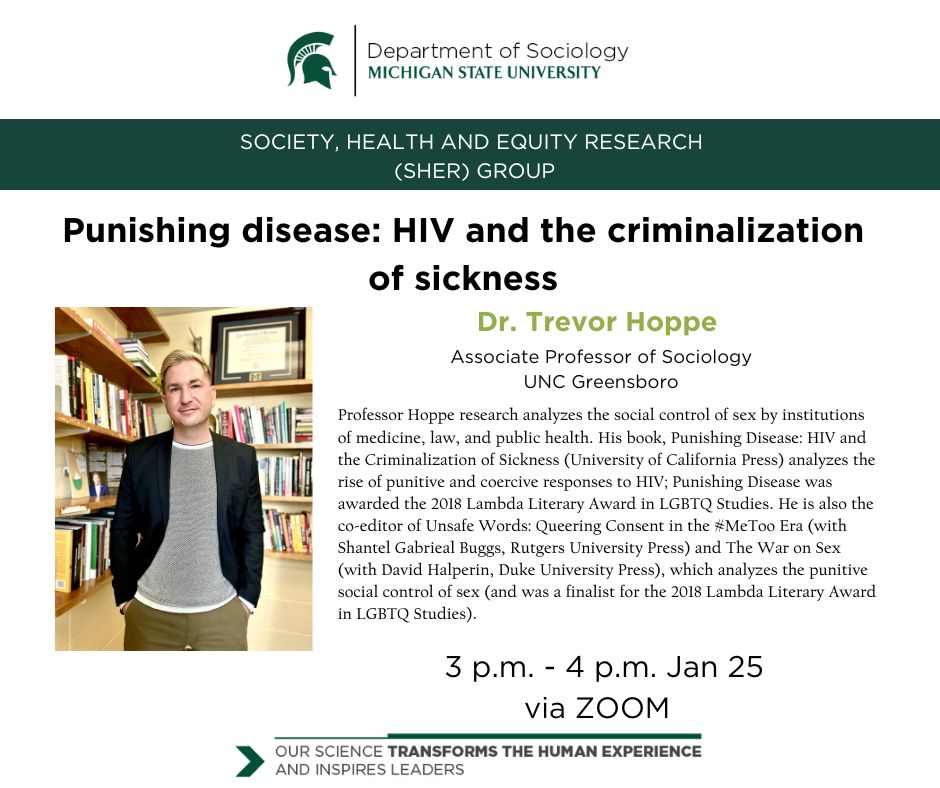Society, Health and Equity Research (SHER) Group
SHER, formerly FPH (Family, Population, and Health) Lab, is a research community of faculty and students broadly interested in health equity and social determinants of health. Our group consists of scholars who study a wide range of topics, including aging and life course; gender, race/ethnicity, sexuality, and socioeconomic status; human-environment interactions; medical uncertainty, knowledge construction, and authority; social relationships and networks using qualitative and quantitative methods. SHER supports student and faculty research through workshops, seminars, collaborations, and mentorships.
To Come
PAST EVENTS

Life Course Dynamics of Gendered Racism and U.S. Black Women's Health
3:30 p.m. Sept. 27, 2024
Society, Health and Equity Research Group presents Dr. Christy L. Erving, Assistant Professor of Sociology at the University of Texas at Austin.
pw:SHER
Family Estrangement: Examing Prevalence and Health Implications
3:30 p.m. November 13, 2024
Society, Health and Equity Research Group presents Dr. Rin Reczek, Professor of Sociology at The Ohio State University
Zoom link: https://msu.zoom.us/j/95415251056
pw:SHER
 Managing Uncomfortable Knowledge About Pesticides: New Zealand's 2002-2004 Urban Pesticide Spraying Campaign
Managing Uncomfortable Knowledge About Pesticides: New Zealand's 2002-2004 Urban Pesticide Spraying Campaign
3 p.m. March 7, 2024
Society, Health and Equity Research Group presents Dr. Manuel Vallee, from the University of Auckland, New Zealand, to give a talk on his latest book, Urban Aerial Pesticide Spraying Campaigns: Government Disinformation, Industry Profits, and Public Harm (Routledge 2023).
 PUNISHING DISEASE: HIV AND THE CRIMINALIZATION OF SICKNESS
PUNISHING DISEASE: HIV AND THE CRIMINALIZATION OF SICKNESS
3 p.m. Jan. 25, 2024
Professor Hoppe research analyzes the social control of sex by institutions of medicine, law, and public health. His book, Punishing Disease: HIV and the Criminalization of Sickness (University of California Press) analyzes the rise of punitive and coercive responses to HIV; Punishing Disease was awarded the 2018 Lambda Literary Award in LGBTQ Studies.
pw: sher2324
 Aging and the social brain: The role of social networks in dementia
Aging and the social brain: The role of social networks in dementia
October 12, 3 p.m. - 4 p.m.
Register here
Brea Perry is a Professor of Sociology and an affiliated faculty of the Indiana University Network Science Institute. She began her career at the University of Kentucky before returning to Indiana University in 2014, where she received her PhD in 2008. Her research investigates the interrelated roles of social networks, biomarkers, social psychology, and social inequality in health and illness, with a particular focus on mental illness and substance use disorders.
 The Immune System and the Brain: What can they tell us about racism and chronic disease risk?
The Immune System and the Brain: What can they tell us about racism and chronic disease risk?
Dr. Bridget Goosby
Professor of Sociology
University of Texas at Austin
Immune system activity plays a critical role in chronic inflammatory conditions such as diabetes, hypertension, cardiovascular disease, and autoimmune diseases. Inflammation, which is a function of immune activity, is also associated with psychological conditions including depression, anxiety, and post-traumatic stress disorders. In the US, minoritized populations are at higher risk for experiencing many of these health conditions, with risk being linked to contexts shaped by racism and discrimination. Social scientists are increasingly using biosocial approaches to study how racism ‘gets under the skin,’ but tend to do so in ways that mimic the reductionism of the biological sciences they borrow from. In this talk, I will consider how the brain and immune system interact with one another and how these processes shape health and behavior. In doing so, this discussion seeks to develop a more inclusive perspective for understanding biosocial pathways linking social conditions to health outcomes via the dynamic interplay between the brain and immune function.12 p.m. Friday Jan. 20, 2023
over Zoom
https://msu.zoom.us/j/98320267241
Meeting ID: 983 2026 7241
Passcode: Goosby
Current Faculty Members
- Saleh Ahmed
- M. Isabel Ayala
- Cliff Broman
- Bill Chopik
- Maria Isabel Espinoza
- Ning Hsieh
- PJ Pettis
- stef shuster
- Zhenmei Zhang

